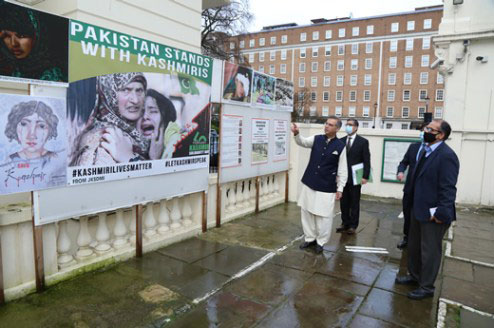Dr Syed Nazir Gilani
The Pakistan High Commission in London organised an impressive event to mark the 74th year of Indian illegal occupation of Jammu and Kashmir.
It was participated in person and virtually by people of Kashmiri descent, members of British Parliament, local councillors, scholars, and Pakistanis from various disciplines of life. I participated virtually and found the occasion a sombre one.
In aggregate it was a valuable experience and reflected a deep sense of duty to highlight the plight of the people of Kashmir.
High Commissioner, Moazzam Ahmad Khan and his team had worked very hard for the event. The event was moderated by Rabia Kasuri, a senior diplomat at the High Commission.
Expression of support and solidarity has continued for the last 74 years. Pakistan and its outposts all over the world remain the compass, in setting trends, to meet the challenge, as they surface around the people and the habitat of Kashmir.
It is a common sense that we can’t undo the continued Indian occupation by recycling our efforts of word and manner. There has to be a difference and every event has to stand out fresh and improved than the one before.
Unfortunately very little attention is being paid to re-do our political narrative presented at these events.
Very little attention has been paid by social, political and human rights activists to update the knowledge on Kashmir and upgrade the manner of their efforts to help the just cause of Kashmir.
For example, a member of British Parliament of Kashmiri descent at the event, thought that October 27, 1947 was a “martyrs’ day”. While as the advice note of the High Commission had slated it as “Jammu and Kashmir Black Day – 27th October 1947”.
The Member of British Parliament of Kashmiri descent should have been clear about the merits of the event.
What could be different that could further the just cause of the people of Kashmir, should be the first concern for every participant at these events.
It does not add to the merits of any party, if we have nothing new to punctuate our narrative, at the new event. A repeat and carrying each time the same sack of ‘lock, stock and barrel’ does not help.
It is a waste of resource and time. In fact it helps India to see us as people of a very modest and little challenge.
It is equally unhelpful if a speaker begins to say that he will not repeat or examine the history of the case.
In fact Kashmir case or the jurisprudence of Kashmir case is based on history and on the sequence of dates.
The first date is August 15, 1947 when Jammu and Kashmir entered a Stand Still Agreement with the Government of Pakistan.
The second date is 26 October 1947 when Prime Minister of India sent a telegram to the Prime Minister of Great Britain, informing him that Government of India was sending its military to Kashmir to ‘help’ the ruler.
The third and fourth important dates are 28 October 1947 and 31 October 1947 when the Prime Minister of India assured the Prime Minister of Pakistan that the sending of army is temporary and it would be withdrawn as soon as peace and order returned and the accession issue would be referred to the people.
The fifth and most important date is 15 January 1948 when Government of India surrendered its conditional accession at the UN Security Council for a UN-supervised vote.
What new could have been introduced and need to be addressed without a further delay? It is the manner in which United States of America intervened in Russia in 1891 to seek the protection of Jews.
It is the manner in which Britain and France intervened in Morocco in 1909 and sought the protection of Christians.
The first intervention by US in Russia was on the principle “sic utere tuo ut alteram non laedas” and the second intervention by Britain and France in Morocco was on the basis of “The Laws of Humanity”.
The principle of “sic utere tuo ut alteram non laedas” was used in the case of Rylands vs Fletcher decided 17 July 1868 by Lord Cairns, LC and Lord Cranworth in the House of Lords.
Eighteen years later United States of America used this principle and drew the Russian Czar’s attention to “the injury it was suffering as a result of the arrival on its territory of the large numbers of Jewish refugees, who were attempting to escape repression”.
Government of Pakistan has 2.5 million Kashmiri refugees living in the four provinces. There has been a fresh displacement in 1990.
Pakistan could very conveniently call out India under the principle of “sic utere tuo ut alteram non laedas” and para 12 of UN Security Council Resolution 47 makes a strong case on this count.










